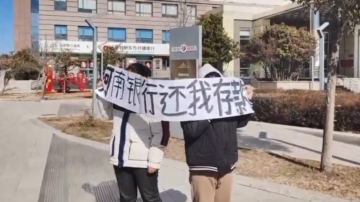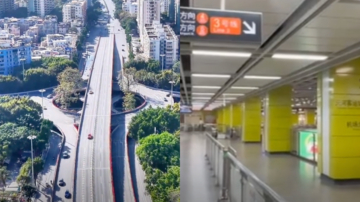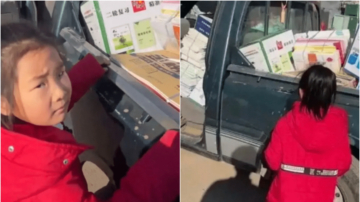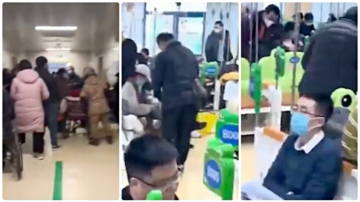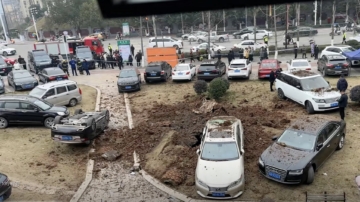【新唐人2014年08月14日讯】近两年,大陆房市持续低迷、成交量不断走低,房价也开始下跌。继部分房企因为资金链断裂而破产跑路之后,一些房屋买家也“弃房断供”,让本已寒意甚浓的大陆房市雪上加霜。各地方政府为确保土地财政,纷纷出手“松绑”限购令,意图挽救楼市。但放松限购令的实际效果到底是否能如当局所愿,外界充满质疑。
大陆《21世纪经济报导》最近披露,今年五、六月份,浙江杭州、江苏无锡、福建宁德、江苏新沂等地,都出现业主个人按揭贷款逾期未还,而被银行起诉的案例。而早在去年7月,民间金融高度发达的浙江温州就曾爆出,各类“弃房”案例达595例,产生不良贷款4亿多元。
报导说,目前还没有更多数据显示“弃房断供”已成为全国普遍现象,但是,大陆监管部门自身披露的信息早已印证了这一问题的严重。
5月12号,大陆央行副行长刘士馀主持召开“住房金融服务”专题座谈会。会议透露出的信息就包括:为防止购房者因为房价下跌而断供,央行要求银行优先确保住房贷款。
两周前,银监会主席尚福林也承认:三、四线城市相关信贷风险需高度关注,一些中小房企的资金链紧张,部分地区已出现房企甚至业主违约。
浙江财经大学经济与国际贸易学院教授谢作诗:“为甚么出现?一定是房价跌的程度超过了首付。或者说房子现在的价值都比不过未来要还银行的钱。”
“浙江财经大学经济与国际贸易学院”教授谢作诗向《新唐人》表示,长期来看,“弃房断供”现象未来还会增加。因为如果当局不去再次大规模印发货币救市的 话,房价只会下跌。但即使是增发货币,进行经济刺激,效果也是短暂的,一旦这种“强心剂”不再打了,经济下滑、房价下跌都是必然的。
2010年,为打压房市泡沫,北京首先发出“限购令”,之后广州、上海、杭州等十多个城市紧随其后。第二年,近五十个二、三线城市也实行“限购令”。但限购令的出现,并没有有效抑制大陆房价的飞涨。
而随着近两年来中国经济的整体下滑、房市的持续量价齐跌,各级政府为保证土地财政,又纷纷取消限购令。今年6月,内蒙古呼和浩特市首先宣布撤销“限购令”。此后,济南、海口、温州等城市陆续跟上。到了8月,合肥、金华、太原、长沙、佛山也取消限购。
贵州遵义和业房地产经纪有限公司杨先生:“房价现在跌的太厉害了。不可能政府不救。政府肯定还是要出一些宽松的政策让人家买房子。都没有人买了,肯定经济会瘫痪的。”
但在中国整体经济下滑、房价过高的情况之下,“松绑”限购令到底能否盘活楼市,各界普遍持怀疑态度。
谢作诗:“放松限购或者是放弃限购,也不能阻止房价下跌。我买房干啥?是希望它增值。知道房价预期下跌,我不买了。我不买了,你放松限购有甚么用呢?我本来就不打算买。”
《自由亚洲电台》援引长沙作家肖建生的观点表示,即使解除限购,也不能解决问题:因为现在房屋还是处于有价无市的状态,进城的农民仍然买不起房。而买得起房子的人现在早已有房子住。
根据“中国指数研究院”公布的最新报告,尽管各地争先取消限购令,7月份大陆100个城市新建住宅均价环比下跌0.81%,跌幅较上个月扩大,其中北京、上海等十大城市全部环比下跌、且跌幅超过全国。
采访/易如 编辑/李谦 后制/钟元
House Owners Default On Mortgages, Authorities Relax Purchasing Restrictions
Over the past two years, the mainland housing market has
remained in the doldrums with trading volume in decline.
Following the flee of property developers due to funding
strand breaks and bankruptcy, some home buyers
are abandoning houses and defaulting on mortgages,
further aggravating the chilled housing market.
In order to ensure government finance, which is dependent
on the funds from sold land, the local governments
have deregulated the existing home purchase restriction
orders intended to save the property market.
The public is full of doubt regarding whether the practical
effect of the relaxed restriction order will achieve
the authorities wishes in the end.
A Mainland 21st Century Economic Report recently disclosed
that in May and June of this year, Hangzhou City of Zhejiang
Province, Wuxi City of Jiangsu Province, Ningde City of Fujian
Province, Xinyi City of Jiangsu Province and others are all
experiencing defaults on personal mortgage loans.
The bank sued the property owners.
As early as last July, 595 cases of all kinds of house
abandonments occurred in Wenzhou City of Zhejiang
Province, which has a highly developed private finance,
resulting in more than 400 million yuan worth of bad loans.
The report says no data is available to show the common
phenomenon of housing foreclosures.
However, information disclosed by the Mainland regulatory
authorities has confirmed the severity of the problem.
On May 12, Mainland Central Bank Vice President Liu Shiyu
hosted the Housing Finance Service Symposium Conference
which disclosed information regarding the prevention
of buyers from foreclosing due to falling house prices.
The Central Bank requires all banks
to give priority to housing loans.
Two weeks ago, China Banking Regulatory Commission
Chairman Shang Fulin admitted third and fourth-tier cities
need to give a lot of attention to the credit risk.
Some small and medium-size property enterprises
suffered capital chain tension.
Some housing property enterprises and even home buyers
broke contracts in some areas.
Xie Zuoshi is a Professor of Economics and International
Trade School of Zhejiang University of Finance.
He says, "Why did this happen?
This must be due to prices falling
more than the down payment.
Or the value of the house now is lower than the returned
loan payment to the bank in the future."
Professor Xie Zuoshi told NTDTV that in the long term,
the foreclosure phenomenon will increase in the future.
If the authorities do not repeatedly issue large-scale bills
to bailout the property market, housing prices
will continue to fall.
But even if more currency is issued and enhancements are
made to the economic stimulus, the effects are short-lived.
Once a "shot in the arm" is no longer given, the economic
downturn and falling house prices are both inevitable.
In 2010, in order to suppress the housing bubble, Beijing
issued the first restriction order on house purchases,
and more than a dozen cities including Guangzhou,
Shanghai, Hangzhou and others followed suit.
Over the next year, nearly 50 second and third-tier cities
also implemented restriction orders.
But the application of the purchase orders did not
effectively inhibit the soaring Mainland housing prices.
Along with the overall decline of the Chinese economy
over the past two years, and persistently decreased
transactions and the reduced prices in the housing market,
governments at all levels have to cancel purchase orders
to ensure the operation of the land-dependent finance.
In June of this year, Hohhot City of Inner Mongolia first
announced its withdrawal of its restriction order.
Since then, Jinan, Haikou and Wenzhou cities
have followed.
Up until August, Hefei, Jinhua, Taiyuan, Changsha,
Foshan also cancelled purchase restrictions.
Mr. Yang, Heye Real Estate Brokers Company, Zunyi City
of Guizhou Province: "House prices fell too much now.
It is impossible for the government not to save.
Government is certainly able to produce some liberal
policies to promote house transactions.
If no one buys, then the economy
is of course paralyzed."
However, under the circumstances of China's overall
economic downturn and overly-high property prices,
the public is generally skeptical that deregulating
restrictions will save the property market.
Xie Zuoshi: "Relaxing the restriction order or abandoning
the restriction order cannot stop the falling housing prices.
So what's the aim for me to buy a property?
I buy a house in the hopes that the value increases
in the future.
If the house prices are expected to fall, then I do not buy.
If I do not buy, what sort of use is there in relaxing
the purchase order, I would have had no intention to buy."
Radio Free Asia quoted writer Mr. Xiao Jiansheng from
Changsha City and reported that even if the restriction
is lifted, the key problems cannot be solved because
there is not much buying capacity in the housing market.
Migrant farmers in the city still cannot afford
current housing prices.
Those people who can afford current housing prices
previously had a place to live.
According to the latest report published by China Index
Academy, many places across the country rushed to cancel
purchase orders in July, although the average price of new
homes in 100 mainland cities decreased by 0.81 percent.
MoM continued to decline compared to last month.
Among these 100 cities, the top ten cities
including Beijing and Shanghai have all experienced
falling prices, and the range is higher than
the national average.
Interview/YiRu Edit/LiQian Post-Production/ZhongYuan
大陆《21世纪经济报导》最近披露,今年五、六月份,浙江杭州、江苏无锡、福建宁德、江苏新沂等地,都出现业主个人按揭贷款逾期未还,而被银行起诉的案例。而早在去年7月,民间金融高度发达的浙江温州就曾爆出,各类“弃房”案例达595例,产生不良贷款4亿多元。
报导说,目前还没有更多数据显示“弃房断供”已成为全国普遍现象,但是,大陆监管部门自身披露的信息早已印证了这一问题的严重。
5月12号,大陆央行副行长刘士馀主持召开“住房金融服务”专题座谈会。会议透露出的信息就包括:为防止购房者因为房价下跌而断供,央行要求银行优先确保住房贷款。
两周前,银监会主席尚福林也承认:三、四线城市相关信贷风险需高度关注,一些中小房企的资金链紧张,部分地区已出现房企甚至业主违约。
浙江财经大学经济与国际贸易学院教授谢作诗:“为甚么出现?一定是房价跌的程度超过了首付。或者说房子现在的价值都比不过未来要还银行的钱。”
“浙江财经大学经济与国际贸易学院”教授谢作诗向《新唐人》表示,长期来看,“弃房断供”现象未来还会增加。因为如果当局不去再次大规模印发货币救市的 话,房价只会下跌。但即使是增发货币,进行经济刺激,效果也是短暂的,一旦这种“强心剂”不再打了,经济下滑、房价下跌都是必然的。
2010年,为打压房市泡沫,北京首先发出“限购令”,之后广州、上海、杭州等十多个城市紧随其后。第二年,近五十个二、三线城市也实行“限购令”。但限购令的出现,并没有有效抑制大陆房价的飞涨。
而随着近两年来中国经济的整体下滑、房市的持续量价齐跌,各级政府为保证土地财政,又纷纷取消限购令。今年6月,内蒙古呼和浩特市首先宣布撤销“限购令”。此后,济南、海口、温州等城市陆续跟上。到了8月,合肥、金华、太原、长沙、佛山也取消限购。
贵州遵义和业房地产经纪有限公司杨先生:“房价现在跌的太厉害了。不可能政府不救。政府肯定还是要出一些宽松的政策让人家买房子。都没有人买了,肯定经济会瘫痪的。”
但在中国整体经济下滑、房价过高的情况之下,“松绑”限购令到底能否盘活楼市,各界普遍持怀疑态度。
谢作诗:“放松限购或者是放弃限购,也不能阻止房价下跌。我买房干啥?是希望它增值。知道房价预期下跌,我不买了。我不买了,你放松限购有甚么用呢?我本来就不打算买。”
《自由亚洲电台》援引长沙作家肖建生的观点表示,即使解除限购,也不能解决问题:因为现在房屋还是处于有价无市的状态,进城的农民仍然买不起房。而买得起房子的人现在早已有房子住。
根据“中国指数研究院”公布的最新报告,尽管各地争先取消限购令,7月份大陆100个城市新建住宅均价环比下跌0.81%,跌幅较上个月扩大,其中北京、上海等十大城市全部环比下跌、且跌幅超过全国。
采访/易如 编辑/李谦 后制/钟元
House Owners Default On Mortgages, Authorities Relax Purchasing Restrictions
Over the past two years, the mainland housing market has
remained in the doldrums with trading volume in decline.
Following the flee of property developers due to funding
strand breaks and bankruptcy, some home buyers
are abandoning houses and defaulting on mortgages,
further aggravating the chilled housing market.
In order to ensure government finance, which is dependent
on the funds from sold land, the local governments
have deregulated the existing home purchase restriction
orders intended to save the property market.
The public is full of doubt regarding whether the practical
effect of the relaxed restriction order will achieve
the authorities wishes in the end.
A Mainland 21st Century Economic Report recently disclosed
that in May and June of this year, Hangzhou City of Zhejiang
Province, Wuxi City of Jiangsu Province, Ningde City of Fujian
Province, Xinyi City of Jiangsu Province and others are all
experiencing defaults on personal mortgage loans.
The bank sued the property owners.
As early as last July, 595 cases of all kinds of house
abandonments occurred in Wenzhou City of Zhejiang
Province, which has a highly developed private finance,
resulting in more than 400 million yuan worth of bad loans.
The report says no data is available to show the common
phenomenon of housing foreclosures.
However, information disclosed by the Mainland regulatory
authorities has confirmed the severity of the problem.
On May 12, Mainland Central Bank Vice President Liu Shiyu
hosted the Housing Finance Service Symposium Conference
which disclosed information regarding the prevention
of buyers from foreclosing due to falling house prices.
The Central Bank requires all banks
to give priority to housing loans.
Two weeks ago, China Banking Regulatory Commission
Chairman Shang Fulin admitted third and fourth-tier cities
need to give a lot of attention to the credit risk.
Some small and medium-size property enterprises
suffered capital chain tension.
Some housing property enterprises and even home buyers
broke contracts in some areas.
Xie Zuoshi is a Professor of Economics and International
Trade School of Zhejiang University of Finance.
He says, "Why did this happen?
This must be due to prices falling
more than the down payment.
Or the value of the house now is lower than the returned
loan payment to the bank in the future."
Professor Xie Zuoshi told NTDTV that in the long term,
the foreclosure phenomenon will increase in the future.
If the authorities do not repeatedly issue large-scale bills
to bailout the property market, housing prices
will continue to fall.
But even if more currency is issued and enhancements are
made to the economic stimulus, the effects are short-lived.
Once a "shot in the arm" is no longer given, the economic
downturn and falling house prices are both inevitable.
In 2010, in order to suppress the housing bubble, Beijing
issued the first restriction order on house purchases,
and more than a dozen cities including Guangzhou,
Shanghai, Hangzhou and others followed suit.
Over the next year, nearly 50 second and third-tier cities
also implemented restriction orders.
But the application of the purchase orders did not
effectively inhibit the soaring Mainland housing prices.
Along with the overall decline of the Chinese economy
over the past two years, and persistently decreased
transactions and the reduced prices in the housing market,
governments at all levels have to cancel purchase orders
to ensure the operation of the land-dependent finance.
In June of this year, Hohhot City of Inner Mongolia first
announced its withdrawal of its restriction order.
Since then, Jinan, Haikou and Wenzhou cities
have followed.
Up until August, Hefei, Jinhua, Taiyuan, Changsha,
Foshan also cancelled purchase restrictions.
Mr. Yang, Heye Real Estate Brokers Company, Zunyi City
of Guizhou Province: "House prices fell too much now.
It is impossible for the government not to save.
Government is certainly able to produce some liberal
policies to promote house transactions.
If no one buys, then the economy
is of course paralyzed."
However, under the circumstances of China's overall
economic downturn and overly-high property prices,
the public is generally skeptical that deregulating
restrictions will save the property market.
Xie Zuoshi: "Relaxing the restriction order or abandoning
the restriction order cannot stop the falling housing prices.
So what's the aim for me to buy a property?
I buy a house in the hopes that the value increases
in the future.
If the house prices are expected to fall, then I do not buy.
If I do not buy, what sort of use is there in relaxing
the purchase order, I would have had no intention to buy."
Radio Free Asia quoted writer Mr. Xiao Jiansheng from
Changsha City and reported that even if the restriction
is lifted, the key problems cannot be solved because
there is not much buying capacity in the housing market.
Migrant farmers in the city still cannot afford
current housing prices.
Those people who can afford current housing prices
previously had a place to live.
According to the latest report published by China Index
Academy, many places across the country rushed to cancel
purchase orders in July, although the average price of new
homes in 100 mainland cities decreased by 0.81 percent.
MoM continued to decline compared to last month.
Among these 100 cities, the top ten cities
including Beijing and Shanghai have all experienced
falling prices, and the range is higher than
the national average.
Interview/YiRu Edit/LiQian Post-Production/ZhongYuan

